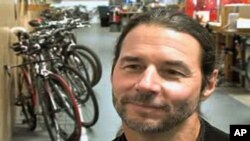After the December 2004 Indian Ocean tsunami killed more than 200,000 people, Chicago businessman Frederick K. Day wanted to help survivors rebuild their lives. As the founder of Sram Corporation, maker of high end components for racing bicycles, Day felt his greatest contribution would be what he knew best-he put his knowledge of bicycles to use and formed World Bicycle Relief.
The bicycle Lance Armstrong rode across the finish line in his record-setting Tour De France victories, was in part, made possible by Chicago-based Sram Corporation.
"The last two Tour De France winners were on our components. Last year, the first second and third place folks were on our components," Day said.
Frederick Day, also known as F.K., founded the cycling company with his brother in the 1980s. Sram is now the world's second largest manufacturer of bike components. "We make every single part that goes onto a bicycle frame, but we don't make the final bicycle," he said.
When the Indian Ocean tsunami struck in late 2004, Day wanted to put his experience to use and make a difference in the lives of survivors. He flew to Sri Lanka to talk with relief organizations about how he could help. They suggested money. Day had a better idea.
"You can do a large scale bicycle program? The impact would be huge! Then we selected a partner, and together we delivered 24,400 bikes into Sri Lanka," he says, "all locally sourced and manufactured."
That experience planted the seed for what became World Bicycle Relief. Now, Day's charity is focused on sub-Saharan Africa.
Sram's expertise has helped World Bicycle Relief put a more durable and affordable bike - locally manufactured - onto the rugged roads and trails of Zambia. The non-profit also trains local mechanics to repair the bikes.
Day says the program has put more than 50,000 bikes into circulation in Zambia. The rewards for the riders are immediate.
"With a bicycle, you can go get fresh water, with a bicycle you can get medical care, with a bicycle you can go to your job or find a better job," Day says, "So it doesn't provide you fresh water, but it gives you the ability or access to it. And it's all about access."
"The need is insatiable," Todd Ricketts said. Ricketts serves on the board of directors at World Bicycle Relief. He says the true value of the bike, which costs about $135 wholesale, far exceeds its cost. "You see people putting hundreds of pounds on these bicycles, and you realize that if they didn't have that, they would have no way of getting to market or they would have to build something themselves that would be rudimentary," he adds.
Though he still owns part of Sram Corporation, Day now spends much of his time on expanding World Bicycle Relief. The success in Zambia has paved the way for similar operations in Zimbabwe and Kenya.
Though he's made a success out of increasing the performance of racing bikes, he says his greatest achievement is boosting the quality of life for the world's poor.
"To me the highest performing bike I have ever seen is the bike in the hands of a girl student fighting for her education," Day recalls, "or the bike in the hands of a mother fighting to feed her children, there is no higher performing bike than that""
Day's efforts to change lives have placed him on financial magazine Barron's list of the top 25 Best Givers in 2010.




